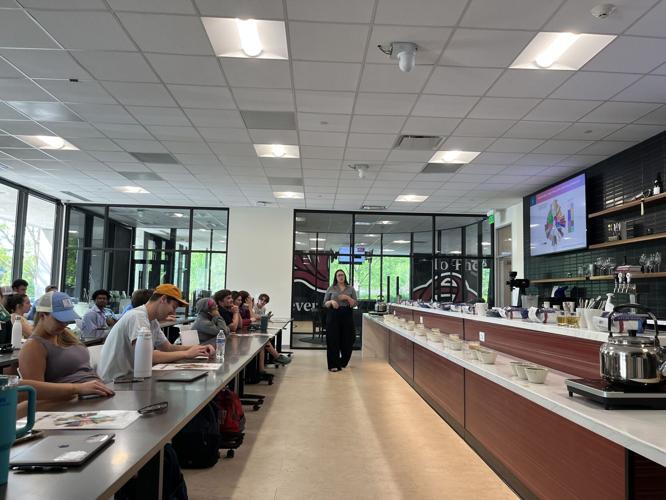COLUMBIA — A group of three dozen students took turns slurping spoonfuls of coffee from small, white mugs set across a large counter at the University of South Carolina. The aroma of espresso beans lingered as students shuffled down the line and took notes.
"Table manners out the window," Audre Langebartel told the class. "We're going to slurp ... that's going to spray the coffee across your entire palate and wake up all of your senses."
Langebartel, a regional manager for the Charleston location of Counter Culture Coffee, was leading a coffee cupping for the students to taste and smell the fresh brews and take notes on flavor profiles. The process is similar to that of a coffee shop or restaurant owner looking to determine what beans they will carry at their eatery.
The instruction took place in a new type of classroom for the University of South Carolina — a beverage lab complete with a handful of beer fermentation tanks, sinks, counter space for crafting cocktails and large espresso machines. Rather than a stuffy lecture hall, students face a massive bar that holds four beer taps, a variety of coffee machines and shelves of wine glasses.
Coffee is a restaurant's last impression, explained professor Sandy Strick.
"We say all the time that people don't really get how important beverage is in the world of food and beverage. There's so much money to be made in that, and so much satisfaction and so much hospitality in it," Strick said.
In a corner classroom space once used as a server room to store computers, students in the school's hospitality program can now get hands-on training outside of the McCutchen House, a restaurant on campus that the school has long used to prepare students for food and beverage jobs. The lab opened for classes in January.
The coffee cupping demonstration was the first time Strick has been able to do something so hands-on for her students in the Introduction to Wine and Spirits class. Other instructors, like Robby Lybrand, have used the space to walk students through the process of brewing beer. Scott Taylor used it to hold nonalcoholic cocktail competitions for students.
The beverage lab, which took over two years to get up and running, has seen nearly 300 students this semester and opened alongside the school adding a new minor in beverage studies.
The opening of the lab comes during a rebuilding stage for the restaurant and service industry, as effects of the COVID-19 pandemic on the dining industry still linger. The number of students in the hospitality and tourism management program has dipped slightly since the 2020-21 school year but has still remained ranked the highest program among its Southeastern Conference (SEC) counterparts.
On top of benefiting students in the program, Taylor and Strick said the classroom is popular with prospective students and even those just taking a hospitality class as an elective.
"I have three students in my class that are public health majors. They all walked in on Day 1 and they're like, 'This is the coolest room on campus,'" Taylor said.











